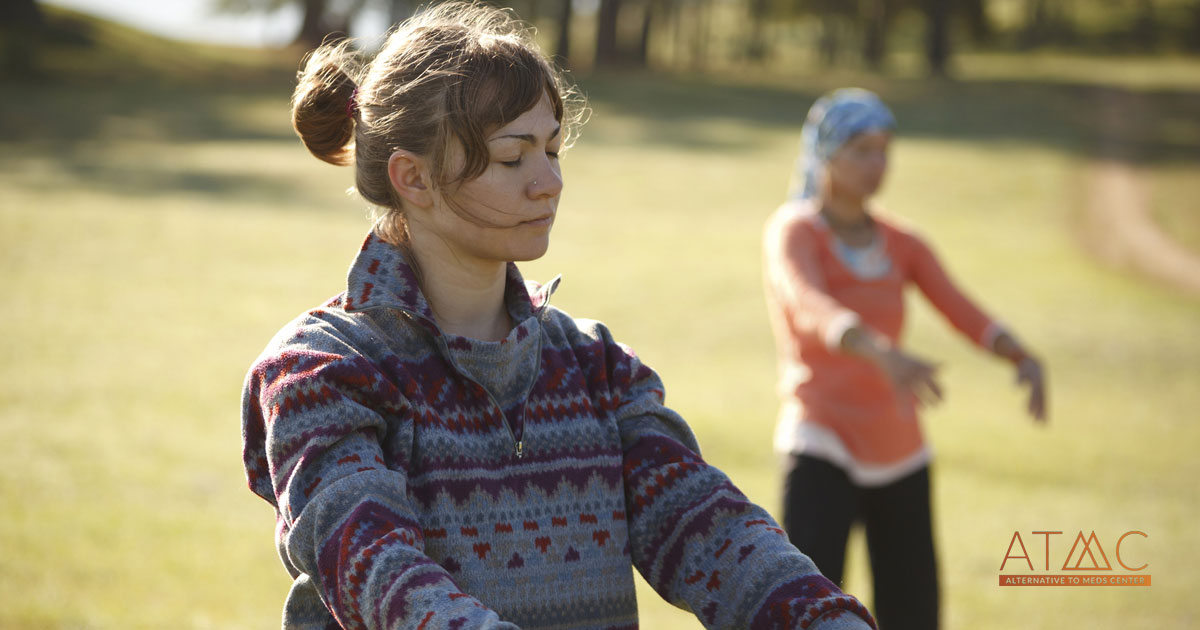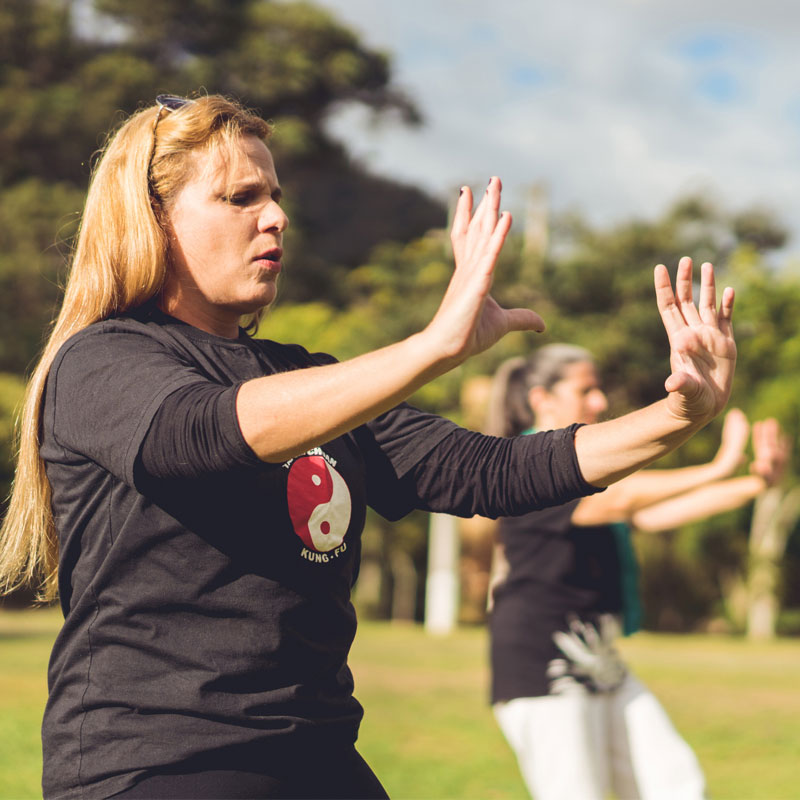 Photo from Getty Images
Photo from Getty Images
Originally Posted On: https://www.alternativetomeds.com/blog/qigong-addiction-treatment/
Successful addiction treatment can be a long road with many paths to choose from along the way. The most beneficial treatment methods are often those that focus on a holistic, or whole-person, recovery process, including naturally derived therapies. These therapies assume that successful healing of the body and mind can take place without the use of pharmaceutical medications.
For those in substance use recovery, a holistic program that includes services such as Qigong can be the key to healing the mind, body and soul. Learn more about this ancient Chinese therapy and how it demonstrates tangible results for modern recovery.
What Is Qigong?
Qigong (chee-gong) has been used to promote and restore health for thousands of years and is often referred to as the world’s oldest healthcare system. The way it is practiced can be aptly summed up by the translation of its name: qi means “vital energy,” while gong loosely translates to “skills cultivated through steady practice.” With committed practice and a desire to move energy through your body, Qigong can provide next-level healing.
Originating 4,000 years ago in China, Qigong therapy is based on traditional Chinese principles of medicine. The foundation of these principles is qi, or energy, which is present in everyone’s body. Qigong utilizes a variety of poses and coordinated breaths to promote a healthy flow of qi throughout the body. This flow is what promotes the body’s engagement in the process of healing.
Understanding Energy
As mentioned, Qigong relies on the core theory that qi flows through the bodies of all living things. When energy becomes stagnant or blocked, both mental and physical health problems can develop. This is because holistic healing posits that the body and the mind are equals – a condition that affects the mind can also affect the body, and vice versa. This concept differs from standard medicinal practices, which often prefer to separate the two.
The ancient belief that energy imbalances can affect the body and mind is well in-tune with the holistic medicine theory that toxins and environmental chemicals create imbalances within the brain and body. These imbalances can trigger issues in both bodily and brain systems. While a typical medical professional may suggest pharmaceutical medications to address a chemical imbalance or toxicity, with the right natural detoxifying therapy, the body and mind can once again find balance.
 Photo from Getty Images
Photo from Getty Images
What Does Qigong Look Like?
There are different ways to practice Qigong, but most can be defined as either active (dynamic) or passive. Active Qigong focuses on the use of controlled, slow movements, while passive Qigong relies more heavily on stillness and breathing. Both types of Qigong have the same aim – to restore balance to the body and mind by freeing the flow of qi.
It is important to note that you may practice Qigong by yourself or with others. In addition, in many instances, you can practice Qigong with a therapist as a form of self-healing.
Active Qigong
This practice relies more heavily on controlled body movements and aligning active movement and breathing to promote the movement of energy throughout the body. It is common to rely on subtle, coordinated movements that can promote blood and lymphatic drainage. This promotes balance, muscle strength, and flexibility.
Passive Qigong
For those seeking a less physical approach, passive Qigong may be the best option. This form of Qigong focuses on creating stillness within the body and has a greater focus on the mind. While the body may not be physically moving, the mind must remain active and focused on moving energy throughout the body. Often, passive Qigong is compared to traditional methods of meditation.
Research continues to support evidence that meditation and Qigong can prove beneficial when combating a variety of mental health concerns, such as depression and anxiety. Qigong meditation benefits include a greater ability to achieve peace of mind, which in turn minimizes intrusive thoughts. This prevents daily stressors from causing serious health concerns as they begin to build and overwhelm the body and mind.1
Qigong vs. Yoga
There is a common misconception that Qigong is a form of yoga due to the emphasis on movement and focus within the body and mind. However, this is not the case. While the two therapeutic practices share various similarities, there are also stark differences.
While yoga is available in various stages, it tends to require a significant amount of strength, balance, and the ability to stretch. Qigong tends to focus more heavily on slow, methodical movements paired with breathing. This makes Qigong more accessible to individuals of all ages and physical restrictions.
Benefits of Qigong
 Photo from Getty Images
Photo from Getty Images
It is essential to examine the benefits of any therapy before deciding to incorporate it into your healing or recovery process. With consistent, focused practice, there are a variety of health benefits you can expect from Qigong.
Reduce Blood Pressure
There are numerous external influences that can cause an increase in blood pressure, and stress is chief among them. Qigong is designed to help individuals self-regulate their feelings of stress to achieve both physical and mental relief. In fact, Qigong has demonstrated the ability to minimize the impacts of daily stressors and alleviate ailments such as high blood pressure.
Research shows that physical activity and breathwork, which is a major component of this therapy, can both help to reduce blood pressure. Slow, thoughtful breathing can help calm the sympathetic component of your autonomic nervous system, also known as your fight or flight reaction. In this way, improving the relationship between body and mind via Qigong can help combat high blood pressure. 2
Alleviate Chronic Pain
Chronic pain can impact every aspect of your life, leaving you feeling exhausted and limited in your ability to participate in even the most basic activities. For those struggling with chronic pain, movement is often restricted, helping to prevent any further flares or discomforts. Qigong is an ideal therapeutic solution because it has minimal impact, utilizing controlled breathing and gentle movements to slowly increase circulation, reduce inflammation, and promote healing. For individuals struggling to find an exercise option that provides results without risking injury, Qigong is the solution.
Improved Physical Fitness
As mentioned, Qigong is low impact, utilizing aerobic and strength components that are within most physical means. This enables people of all ages and medical circumstances to participate, including those with limited mobility. For most individuals, any form of exercise is better than no exercise. Movements associated with Qigong can be modified to adapt to any unique need.
Reduce Depression and Anxiety
Qigong is designed to address both the physical body and the mind. Studies have found that Qigong is an effective therapy for individuals with major depressive disorder. Participants who practiced for 45-60 minutes at least 2-3 times a week for twelve weeks experienced lasting relief from their symptoms. Our minds thrive best when there is balance, and Qigong can address the imbalances that directly impact the severity of depression and anxiety symptoms.3
Relieve Cancer-Related Symptoms
Cancer treatment can take a serious toll on the body and mind. It is often necessary to introduce a variety of therapies that can help manage the stress, anxiety, and discomfort of cancer diagnosis and treatment. Researchers found that Qigong is an effective option for managing stress and anxiety related to cancer. When exploring the health benefits of patients dealing with breast cancer, they found that practicing Qigong twice a week for ten weeks proved a distinct improvement in quality of life compared to those who received conventional medical care. Researchers found patients were less tense and experienced relief from anxiety and depression.4
Immune Strength
There is often a false assumption that the more intensive the physical activity, the better the benefits. Qigong is one of many therapies that prove that this is not always true. Slower movements can help lubricate troubled joints, promote circulation, bring balance to the body, and improve the immune system. In this way, Qigong appears to help improve immune system function and inflammatory response.
The Benefits of Qigong for Addiction Treatment
Substance use, much like continued pharmaceutical medication use, can drastically alter the chemical balance in both the brain and body, changing the way the brain works. This continuously disordered operation is why many professionals refer to addiction as a disease: the parts of the brain that address impulse control, decision-making, and more are not operating as they should. For those in addiction recovery, restoring balance to the body and mind can be a complex journey, and Qigong can help.
Qigong is based on the idea of moving energy throughout the body and can serve to detoxify the body in a sense. This can prove beneficial for individuals wanting to utilize Qigong for medication withdrawal. Qigong is designed to address energy blocks so that energy can move freely throughout the body, potentially moving harmful chemicals out of the body and restoring balance. Qigong focuses on breathing techniques as well, which help to relieve the stress and anxiety that comes along with withdrawals as well as in later recovery.
 Photo from Getty Images
Photo from Getty Images
Preparing for Your First Session
If you’ve decided to participate in Qigong therapy for addiction, you’re likely wondering where to start. Here are the answers to a few common Qigong FAQs.
How Often?
One of the most common concerns is how often a person should practice Qigong. To put it simply, there is no one-size-fits-all method when it comes to this therapeutic tool. You can choose to do longer sessions at least a few times a week or participate in 5-10 shorter sessions daily. What matters most is the quality of your session – ensure you choose a time you can focus on the practice to achieve optimal benefits.
What Should I Wear?
When it comes to Qigong, what is most important is that you are comfortable. Since this practice is all about freedom of movement, your clothing decisions should reflect that. Easy-going, flexible wear such as yoga pants or a breathable t-shirt can provide a comfortable range of motion.
What Should I Eat?
While Qigong is not an intensive workout, you still may want to be cautious of what you eat or drink prior to a session. Eating until you’re too full could leave you feeling heavy during your workout while being too hungry could be a distraction from your mental connection to your physical workout. Hydration is always recommended, so it never hurts to have a bottle of water or a light snack on hand.
How Can I Get the Most from Qigong?
You’ll want to ensure you are practicing Qigong correctly, and it can be beneficial to start with a professional who can guide you through the steps and breathing before going solo. This ensures you have a solid foundation before you begin solo Qigong sessions. One of the most common mistakes people make is thinking that they must push themselves. What matters most is the connection between physical movements and breathing, enabling you to ensure energy is flowing through your body.
Learn More About Qigong
 Photo from Getty Images
Photo from Getty Images
Qigong is a holistic healing treatment that has helped people heal from various ailments over thousands of years. Qigong for addiction detox and recovery is designed to help individuals of all ages, body types, and backgrounds achieve balance and promote healing. For those beginning recovery, Qigong can be an effective holistic therapy that, in conjunction with other therapies, can increase your chance of preventing relapse and achieving long-term recovery.
Alternative to Meds Center offers adjunctive Qigong therapy as a part of a comprehensive, science-backed, holistic treatment program. Learn more about how we implement Qigong as a therapy and part of our medication tapering and withdrawal services.
1 (888) 907-7075 for Qigong at ATMC
- Saeed, S. A., Cunningham, K., & Bloch, R. M. (2019). Depression and Anxiety Disorders: Benefits of Exercise, Yoga, and Meditation. American family physician, 99(10), 620–627. https://pubmed.ncbi.nlm.nih.gov/31083878/
- Dong, X., Shi, Z., Ding, M., & Yi, X. (2021). The Effects of Qigong for Hypertension: A Meta-Analysis of Randomized Controlled Trials. Evidence-based complementary and alternative medicine: eCAM, 2021, 5622631. https://doi.org/10.1155/2021/5622631
- Guo, L., Kong, Z., & Zhang, Y. (2019). Qigong-Based Therapy for Treating Adults with Major Depressive Disorder: A Meta-Analysis of Randomized Controlled Trials. International journal of environmental research and public health, 16(5), 826. http://dx.doi.org/10.3390/ijerph16050826
- Oh, B., Butow, P., Mullan, B., Kothe, E., Lam, L., Rosenthal, D. (2010). Impact of Medical Qigong on quality of life, fatigue, mood and inflammation in cancer patients: a randomized controlled trial. Original articles: Quality of life, (21) 3, 608-614. https://doi.org/10.1093/annonc/mdp479





